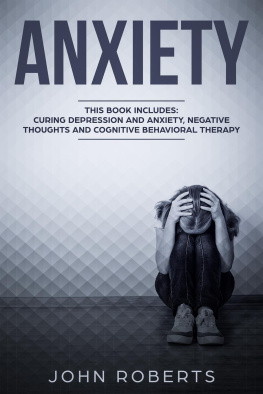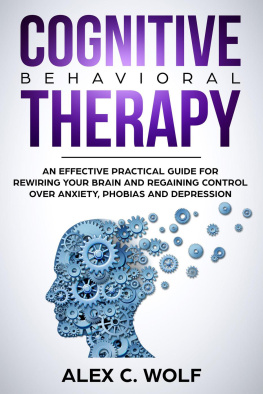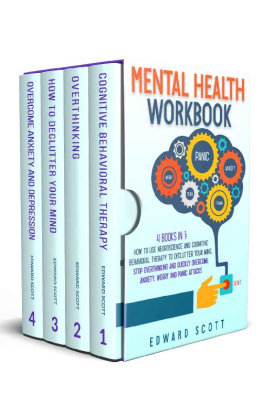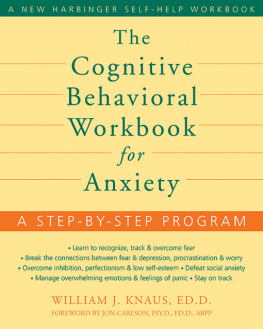Cognitive Behavioral Therapy
Best Strategies to Manage Stress, Anxiety, Worry, Panic, Depression, Anger, and Negative Thoughts
By
Sebastian Loxely
Copyright 2020 by (Sebastian Loxely) - All rights reserved.
This document is geared towards providing exact and reliable information in
regards to the topic and issue covered. The publication is sold with the idea
that the publisher is not required to render accounting, officially permitted, or
otherwise, qualified services. If advice is necessary, legal or professional, a
practiced individual in the profession should be ordered.
- From a Declaration of Principles which was accepted and approved equally
by a Committee of the American Bar Association and a Committee of
Publishers and Associations.
In no way is it legal to reproduce, duplicate, or transmit any part of this
document in either electronic means or in printed format. Recording of this
publication is strictly prohibited and any storage of this document is not
allowed unless with written permission from the publisher. All rights
reserved.
The information provided herein is stated to be truthful and consistent, in that
any liability, in terms of inattention or otherwise, by any usage or abuse of
any policies, processes, or directions contained within is the solitary and
utter responsibility of the recipient reader. Under no circumstances will any
legal responsibility or blame be held against the publisher for any reparation,
damages, or monetary loss due to the information herein, either directly or
indirectly.
Respective authors own all copyrights not held by the publisher.
The information herein is offered for informational purposes solely, and is
universal as so. The presentation of the information is without contract or
any type of guarantee assurance.
The trademarks that are used are without any consent, and the publication of
the trademark is without permission or backing by the trademark owner. All
trademarks and brands within this book are for clarifying purposes only and
are the owned by the owners themselves, not affiliated with this document.
Introduction
We all face difficulties in our lives during some stages, but we perceive it differently. Sometimes we let things go and move on in our life, but some incidents leave a long-lasting impression that could be either good or bad. Having a bad memory in your mind can take you towards anxiety, stress, and depression. There are so many other psychological disorders that are due to our griefs and sorrows.
Cognitive-behavioral therapy is a continuum of talking therapies focused on the premise that our emotions and actions are related together. It provides you the basic principles that you require for changing your negative thoughts with the positive ones. Depression, anxiety, obsessive compulsion disorder, anger, worry, panic attacks, psychosis, or sleeping disorder can be a cause of discomfort in your life. Now, these all can be treated with the help of cognitive-behavioral therapy.
People who have psychological disorders show different signs and have different causes behind their conditions. Such people may show agitation, lack of concentration, fatigue, restlessness, trouble falling asleep, panic attacks, and avoid social gatherings. The cause behind may be the loss of a beloved one, a roadside accident, a mishap in early childhood, or a genetic problem.
Cognitive-behavioral therapy helps you recognize your thinking patterns and restructuring the behavior patterns making your life detangled. Including meditation, healthy eating habits, and good sleep and wake up routine will make you think more productively. There are different cognitive-behavioral therapy types, including cognitive therapy, dialectical behavioral therapy, multimodal therapy, and rational emotive behavioral therapy. The therapist uses these according to the client's condition. For example, an anxiety patient requires dialectical behavioral therapy, and multimodal treatment is used for patients having a traumatic injury.
You may need many sessions for this talk therapy if you are suffering from depression or insomnia or negative thinking, but it will give you long-lasting results. You will develop a better sense of self-esteem, confidence, communication, and helping others. The therapist and the patient make a list of things that are happening to the patients. The therapist changes your ideas by actively listening, understanding them, and showing you a sense of empathy.
Using cognitive-behavioral therapy will start changing your life with every session. It only requires your patience and persistence, and then you can move in your life as you want without any side thoughts prevailing in your mind.
Chapter 1: Understanding Cognitive-Behavioral Therapy
There are several different forms of psychological counseling, each focused on its philosophy and assumptions about how people 'function.' There is a range of main insights into the cognitive behavioral therapy model that helps differentiate it from other therapies. These theories are the foundations on which cognitive-behavioral understandings and therapies have been developed. Some CBT concepts can help to explain what makes it unique.
1.1 What is the Concept of Cognitive-Behavioral Therapy?
Cognitive Behavioral Therapy (CBT) is a successful type of clinical treatment performed by many thousands of practitioners worldwide. Thousands of clinical studies have shown that CBT effectively treats conditions ranging from anxiety and depression to pain and insomnia. It is helpful in your life, including children, teenagers, adults, and older adults can all benefit from it. CBT is also versatile; it is effective face-to-face, through the web, and in self-help formats.
Cognitive-behavioral therapy, or CBT, is a continuum of talking therapies focused on the premise that emotions, and what we do, are related together. If we change these, we can change the others. When people feel worried or upset, we sometimes fall into thinking and reacting patterns, which can make us feel worse. CBT is working to help us recognize and alter unhealthy thought styles or behavior patterns to feel better. CBT has a lot of tactics that can support you in the here and now.
Cognitive Behavioral Therapy (CBT) is a time-sensitive, organized, current-oriented psychotherapy that helps people identify the most critical goals and resolve challenges that get in the way. CBT is based on a cognitive method that the way individuals view a situation is more closely related to their responses than the problem itself.
Cognitive-behavioral therapy (CBT) helps people recognize and modify thought habits and behavioral habits that are negative or counterproductive, replacing them with more accurate thought and practical behavior, allowing them to concentrate on current issues and fix them. It also requires the practice of new skills in the "real world."
CBT is basically about the interpretations people make of their experiences. CBT is frequently misinterpreted as being concerned with 'fixing' flawed thinking processes, being 'reasonable,' or only dealing with 'surface' issues: but all of these are mischaracterizations. When we live our lives, we view what's going on around us: we're developing opinions and understandings.
These definitions affect how we view the universe. Often our convictions are distressing to us, and they can lead to unhelpful ways of acting. A CBT therapist's role is to help clients understand and analyze their beliefs and help them make sense of meaning.








